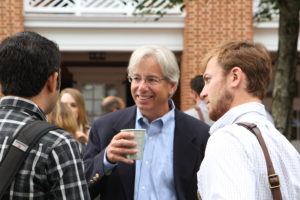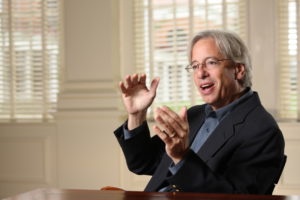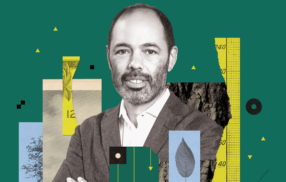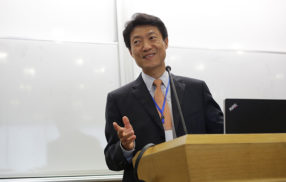
The Business of Storytelling: UVA Darden Professor Marc Lipson
By Dave Hendrick
For Marc Lipson, Robert F. Vandell Professor of Business Administration, one thing is clear about what it takes to succeed in business today: Aspiring leaders need to understand their story and how to tell it.
Helping others develop this ability — to identify, strengthen, and communicate their passion and viewpoint — unites Lipson’s varied professional roles. In addition to his own teaching and research as a professor of finance, Lipson serves as associate dean of the University of Virginia Darden School of Business residential MBA and editor-in-chief of Financial Management, a global financial journal.
“A naïve view of an editor is that I simply select the best papers from those submitted,” Lipson said. “And a similarly naïve view of an MBA program is that it is all about who you admit, and after that it’s just a matter of execution. But I’ve learned that what I’m really doing as an editor and dean, and what is really deeply important to me as a person, is identifying opportunities to help someone be the very best that they can be.”
For Lipson, that means helping students and scholars home in on their passion and develop their voice — their own way to communicate that passion clearly. “Building the ability to tell their unique story is at the heart of how you help authors and how you help students,” he said.

Lipson meets with new Darden students during their first week of classes.
Lipson’s own story includes earning degrees in anthropology and accounting (both from UVA) before getting a Ph.D. in finance. His doctoral research focused on market microstructure — how markets work.
“In my early work on markets, I was drawn to theory and found the research intellectually engaging,” he said. “But I fell in love with market research when I spent a year at the New York Stock Exchange as their visiting economist.”
Being on the floor with traders, he said, helped him realize that research is uncovering something about the way people do things — how people act — which built on his fascination with the human side of decision making. Eventually, his area of expertise became how large institutions affect the way markets function.
He took on the role of editor-in-chief of Financial Management four years ago, and became associate dean at Darden two years later.
As associate dean, Lipson helps ensure that the residential MBA is designed to prepare graduates to be authentic leaders. “In the past decade or so, there’s been a major shift in focus away from authority and toward what I think of as authenticity, which is the ability to effectively create passion and lead people,” he said. One of the most important elements of being an authentic leader, Lipson says, is developing one’s own vision — a way of looking at an organization that is deeply rooted and personal.
“To be an authentic leader, you really do need to have your voice and your viewpoint,” he said. “What a program needs to do, then, is to create a context in which you build your voice and your viewpoint — not an environment in which we tell you what to think and how to think.”

Professor Marc Lipson discusses his roles as a teacher, head of Darden’s residential MBA and editor of a research journal.
At Darden, he says, “you’re forced to communicate, to build solutions and defend them.”
Lipson also still teaches First Year core classes. “The thing that excites me is to see someone who didn’t understand at first how much they could learn and grow suddenly realize what they have achieved and, at that moment, recognize in themselves the magnitude of their potential,” he said. “I see that when I teach in the core.”
As an editor, Lipson helps authors develop this same sense of purpose and voice as they build their scholarship. The process begins with evaluating the potential of each submitted paper (the journal eventually publishes only about 10 percent of papers submitted). This initial evaluation is not an easy step.
“Not every author is skilled at making the impact of their research clear, or seeing their work in the broader context of other research,” Lipson said.
For papers that merit a closer look, he then selects external reviewers who can provide feedback on both the quality of the work and its potential impact. And he guides a review process meant to ensure that each paper is the best it can be.
Toward that end, Lipson has introduced a new annual “writer’s workshop” sponsored by the journal, which solicits papers from scholars early in their careers who have completed papers they want to improve for publication. Lipson and his co-editor select eight papers, and bring their authors together with a group of six top scholars. At the conference, these junior authors get training on research and the elements of a great paper, followed by an intensive workshop of their own papers.
“Something that’s very important to me personally is helping young scholars get a solid start to their careers with some early success,” Lipson said. “I’ve realized that very focused feedback is the most important way to move scholarship forward.”
Lipson also works extensively with all authors to refine their pitch — the all-important abstract that is printed with the work. “The abstract sells the paper,” he said. “Getting the pitch right often actually helps the authors get the work right.” And it helps position the paper so that it has the best chance of being noticed.
“With both authors and students, you want to nurture their story, help them understand their story and strengthen it, and then put them in a position where they can most effectively tell that story,” Lipson said.
“I think there is a natural progression from an early career focus on your own accomplishments to a later focus on the accomplishments of others, to a final focus on the accomplishments of the institution as a whole,” he said. “I’m at the point now where, naturally, I’m thinking about how I can improve the finance research community through a top journal, and how I can improve on Darden’s ability to execute its educational mission.”
The University of Virginia Darden School of Business prepares responsible global leaders through unparalleled transformational learning experiences. Darden’s graduate degree programs (MBA, MSBA and Ph.D.) and Executive Education & Lifelong Learning programs offered by the Darden School Foundation set the stage for a lifetime of career advancement and impact. Darden’s top-ranked faculty, renowned for teaching excellence, inspires and shapes modern business leadership worldwide through research, thought leadership and business publishing. Darden has Grounds in Charlottesville, Virginia, and the Washington, D.C., area and a global community that includes 18,000 alumni in 90 countries. Darden was established in 1955 at the University of Virginia, a top public university founded by Thomas Jefferson in 1819 in Charlottesville, Virginia.
Press Contact
Molly Mitchell
Associate Director of Content Marketing and Social Media
Darden School of Business
University of Virginia
MitchellM@darden.virginia.edu






